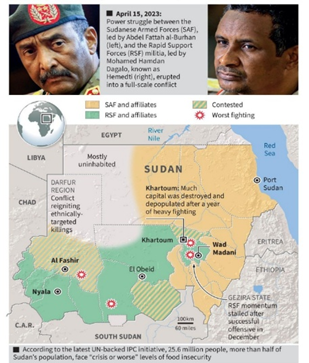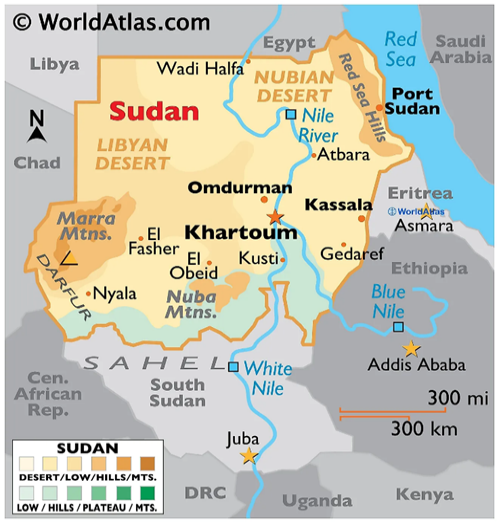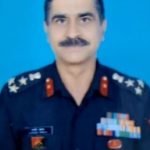Sudan is located in Northeast Africa and is the third largest African nation after Algeria and the Democratic Republic of the Congo. It is bordered by Egypt to the north, Libya to the northwest, Chad to the west, the Central African Republic to the southwest, South Sudan to the south, Ethiopia to the southeast, and Eritrea to the east. The capital city of Sudan is Khartoum, which is located at the confluence of the White Nile and Blue Nile rivers. Sudan is in a volatile region, bordering the Red Sea, the Sahel, and the Horn of Africa. Owing to its strategic location on the Red Sea, access to the Nile River, the vast swath of gold reserves, and agricultural potential, it has long been coveted by outside powers, including its neighbours, the Gulf countries, Russia, and Western nations. The country’s strategic location and agricultural wealth have attracted regional power plays. Hence, stability in Sudan is vital for regional peace and security. Several of Sudan’s neighbours, including Ethiopia, Chad, and South Sudan, have been affected by political upheavals and conflict. Western powers fear the potential for a Russian base on the Red Sea, which Sudanese military leaders have expressed openness to.
For the first half of the 20th century, Sudan was effectively a joint protectorate of both Egypt and the UK, known as the Anglo-Egyptian Condominium. In 1956, Egypt and the UK signed a treaty relinquishing sovereignty to the independent Republic of Sudan. The new country immediately faced many challenges, being located between Africa’s most violent countries and regions. A stark cultural divide existed between the country’s northern, wealthier region, which was majority Arab and Muslim, and its less-developed southern region, where most people were Christian or animist. The combination of these ethnic and religious divides serves to be extremely relevant to the struggles that Sudan faces even to this very day. The country has witnessed 17 attempted coups, seven being successful, along with four civil wars. Omar al-Bashir took power in a 1989 coup and ruled Sudan for 30 years. He imposed a strict interpretation of sharia law, used private militias (Janjaweed) to fight rebels, and persecuted minority religions. His regime was condemned for genocide in Darfur, particularly targeting non-Arab groups like the Fur, Zaghawa, and Masalit. South Sudan gained independence and became an independent state in July 2011, based on a referendum earlier in January.
Several of Sudan’s neighbours, including Ethiopia, Chad, and South Sudan, have been affected by political upheavals and conflict. Western powers fear the potential for a Russian base on the Red Sea, which Sudanese military leaders have expressed openness to
The Darfur conflict began in 2003 in the Darfur region of western Sudan. The complex and ongoing conflict started when rebel groups, mostly made up of members of the Fur, Zaghawa, and Masalit ethnic groups, began attacking government targets, claiming that the government was neglecting the needs of the region and its people. The government of Sudan responded by arming and supporting Arab militias, known as the Janjaweed, who launched a campaign of violence against the rebel groups and the civilian population. The Paramilitary Rapid Support Forces emerged from the Janjaweed militia, a key force in the Darfur conflict responsible for widespread atrocities. Formally organised in 2013, the RSF gained wealth and influence, especially through control over gold mines.
By 2019, protests against Bashir’s oppressive rule intensified, leading to his removal in an April coup supported by both the Sudanese Armed Forces (SAF) and RSF. Despite Bashir’s ouster, civilians continued their demonstrations, seeking democratic elections and the establishment of a civilian government. This led to an agreement between the military and protesters, under which a power-sharing body called the Sovereignty Council, comprising military officers and civilians, was established to lead Sudan to elections by the end of 2023. Abdalla Hamdok, who was appointed Prime Minister for the transitional period, sought economic stability. However, the military overthrew the transitional government led by him in October 2021, and a power struggle ensued between SAF leader Abdel Fattah al-Burhan and RSF leader Hamdan Dagalo (Hemedti), interrupting plans for a transition to elections. The coup also led to repeated pro-democracy protests, and a preliminary deal was reached in December 2021 for a political transition, but negotiations hit a roadblock over the integration of the RSF with the SAF, due to disagreements over the timetable and security sector reforms.
Tension escalated over the control of resources and RSF integration, leading to clashes. There was disagreement over how the 10,000-strong RSF should be integrated into the army and which authority should oversee that process. Hemedti of the RSF wanted to delay the integration for 10 years, but the army said it would take place in the next two years. The civilians called for the handover of lucrative military holdings in agriculture, trade, and other industries, which are crucial sources of power for an army that has often outsourced military action to regional militias. Another point of contention was the pursuit of justice over allegations of war crimes by the military and its allies in the conflict in Darfur from 2003.
The International Criminal Court (ICC) sought trials for Bashir and other Sudanese suspects. Later, the RSF was redeployed around the country, which the army saw as a provocation and threat. With both sides on edge, a ferocious battle broke out. The involvement of foreign actors, such as the Wagner Group and military support from the UAE, has complicated the conflict, making it harder to resolve.
The civil war is rooted in a power struggle between two rival factions of the military government of Sudan, the Sudanese Armed Forces under Abdel Fattah al-Burhan, and the paramilitary Rapid Support Forces under the Janjaweed leader, Hemedti, and began during Ramadan on April 15, 2023
The civil war is rooted in a power struggle between two rival factions of the military government of Sudan, the Sudanese Armed Forces under Abdel Fattah al-Burhan, and the paramilitary Rapid Support Forces under the Janjaweed leader, Hemedti, and began during Ramadan on April 15, 2023. It started in Khartoum but has spread to other regions like Omdurman, Bahri, Port Sudan, and the Darfur and Kordofan states. Both the SAF and RSF are determined to consolidate power, with each faction seeking dominance over the other. The SAF claims to be the legitimate government, while the RSF challenges it. Despite an arms embargo by the United Nations since the 2004 Darfur crisis, weapons continue to flow into the country. Advanced military equipment is often supplied by Russia, China, and the UAE. Each side is receiving external support, reducing their incentive to compromise or seek peace.
Despite numerous ceasefire efforts, particularly led by Saudi Arabia and the US like the Jeddah Declaration (2023), none have succeeded. Raging for more than two years now, the fighting between the SAF and RSF has led to the death of thousands of people. Cities have turned to rubble, and entire communities have been displaced. As the situation further deteriorates with no signs of a ceasefire agreement in the near future, experts believe that the war could kill millions and become a geopolitical nightmare. It is arguably the worst conflict on the planet with very few takers.
With the recent turn of events in Sudan, a question arises of whether governance will be shared between the military, the armed movements, tribal leaders, and the local civilian administrations. With no unified entity, the sovereign institutions will have to cope with the emerging form of decentralised and now-accepted norm of governance. As per Ajmal Din Makki of Sudan Media Forum, Sudan seems to have entered a phase of forced decentralisation, where we are witnessing a gradual shift towards a disintegrating state model. The state is redefining itself from a sovereign state to an authoritarian one, with local forces acting as mini-states within the mother entity.
Over the years, India has developed close ties with Sudan and, in recent years, warmed up to the Government of South Sudan as well. India’s Election Commission helped organise Sudan’s first general elections in the late 1950s
Over the years, India has developed close ties with Sudan and, in recent years, warmed up to the Government of South Sudan as well. India’s Election Commission helped organise Sudan’s first general elections in the late 1950s. It has implemented 49 bilateral projects through concessional lines of credit worth USD 612 million in areas such as energy, transport, and the agribusiness industry in Sudan in 2021. Indian engineers played a major role in setting up the country’s sugar industry and railways. In the last decade, India’s investments have been mainly in the energy sector. In 2003, India’s ONGC Videsh Ltd invested $750 million to acquire 25 per cent equity held by the Talisman group in the Greater Nile Petroleum Operating Company (GNPOC). Therefore, it is natural that conflict and instability in the region will have an adverse impact on India.

India supported Sudan’s efforts to form a transitional government and also supported the Juba Peace Agreement signed by the government in October 2020. Chad, the UAE, and the Intergovernmental Authority on Development (IGAD) were the guarantors, while Egypt and Qatar were witnesses to the peace deal. Under the Indian Technical and Economic Cooperation (ITEC), India offered 290 scholarships to Sudan towards capacity building. Besides, India had offered humanitarian assistance, including food supplies, to Sudan in 2020. Over the years, the bilateral trade between India and Sudan has grown from USD 327.27 million in 2005-06 to USD 1,663.7 million in 2018-19. Indian investments in Sudan and South Sudan were roughly USD 3 billion, out of which USD 2.4 billion was invested in the petroleum sector from ONGC Videsh, our public sector undertaking.
Since India cannot depend only on West Asian countries such as Iran, Iraq, and Saudi Arabia, which constitute the global energy heartland, it has consciously cultivated relations with oil-rich African states like Sudan, Nigeria, and Angola to meet its growing energy demands.
Besides India, amongst other countries, Chinese interests in Sudan have been primarily economic, with a focus on securing oil resources and expanding trade. Beyond oil, China has also invested in other sectors like mining and agriculture, as well as Sudan’s infrastructure development. On the other hand, Russia’s interests in Sudan primarily revolve around establishing a naval base on the Red Sea, particularly in Port Sudan, to expand its naval presence and influence in the region. This strategic move is partly motivated by the uncertain future of its naval base in Syria. Russia is also a major arms supplier to Sudan and seeks to strengthen its military and economic ties with the country. The United States also has multifaceted interests in Sudan, including ending conflict and promoting human rights, especially in Darfur, and preventing Sudan from becoming a haven for terrorists. The US aims to support a peaceful and democratic transition in Sudan, foster economic growth, and provide humanitarian assistance to vulnerable populations. More recently, the United States and the United Nations are launching separate diplomatic initiatives to end the war in Sudan, reflecting intensifying international urgency to resolve the conflict.
Since India cannot depend only on West Asian countries such as Iran, Iraq, and Saudi Arabia, which constitute the global energy heartland, it has consciously cultivated relations with oil-rich African states like Sudan, Nigeria, and Angola to meet its growing energy demands. It will be important for India to protect its investments, trade, and other interests in the area. The Red Sea region is crucial to India’s maritime security strategy. In view of the existing structures of Indo-Sudanese ties and Sudan’s location in the Horn of Africa, India needs to guard its trade, investments, and interests in the region before taking any hasty step of recognising any new regime.
The writer is an armed forces veteran who has been an instructor at OTA, Chennai and Army War College, Mhow. He has commanded an Infantry Battalion Group with UN in Sudan and an Infantry Brigade in the Northern Sector






